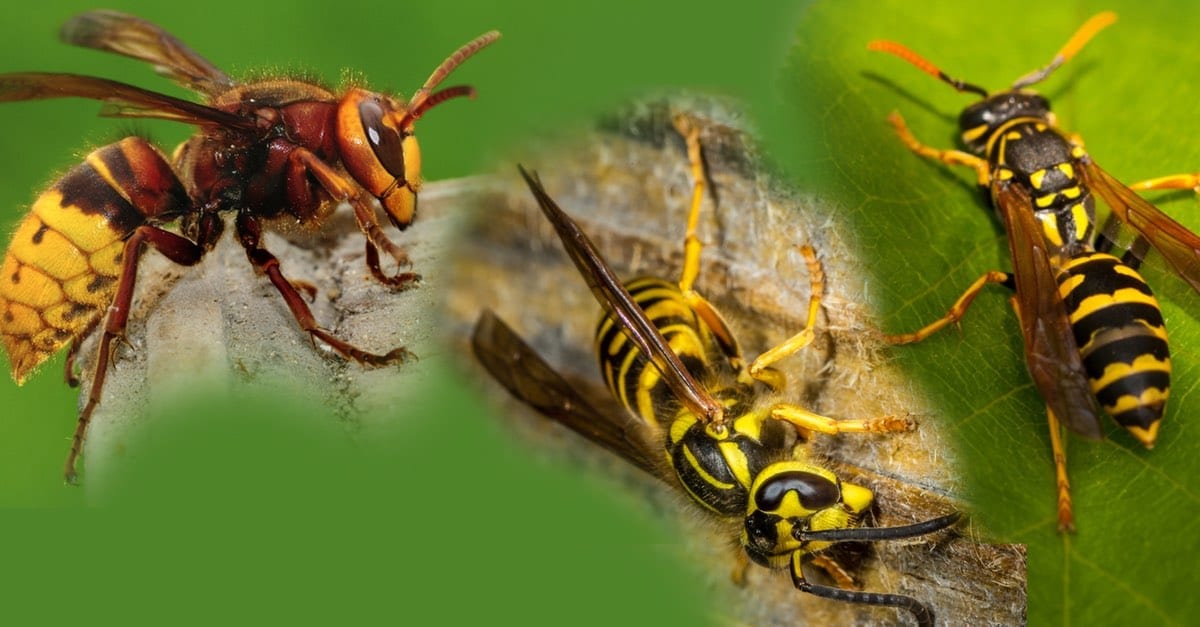Wasps, Hornets, and Yellow Jackets in Full Swing
New Jersey’s nickname is The Garden State and with good reason. That’s because we are home to some of the most beautiful gardens in the world. From the New Jersey Botanical Gardens and the Greenwood Gardens to local backyard gardens, we have it all. This time of year, we also have flying dive bombers in the shape of wasps, hornets, and yellow jackets. We tolerate the honeybee because it does so much for us. However, we’re not as tolerant of these other flying insects.
Are you having problems with wasps, hornets, and yellow jackets? If yes, here is some information on how you can control those problem insects.
Why We Need to Control Wasps, Hornets, and Yellow Jackets
There are a few reasons we must control wasps, hornets, and yellow jackets. One of the major reasons is allergies. Researchers estimate that more than 225,000 ER visits a year are because of an allergic reaction to insect stings. More than 100 people die each year because of an allergic reaction to a sting. Wasps, hornets, and yellow jackets are not as predictable as honeybees. They are difficult to manage because they are aggressive. Also, unlike honeybees, when these insects feel they’re under attack, they release pheromones. These pheromones signal others to come. This can result in multiple, life-threatening stings.
How Can I Tell Which Is Which?
This is a difficult question to answer because you need to treat each differently.
Wasps
Paper wasps are fairly easy to spot. They build nests of wood they chew into a paper-like quality. Their nests look like cones or umbrellas. These wasps like to make nests in places where they can find protection. This could include the underside of lawn furniture, shutters, lights or mailboxes. Paper wasps are usually brown, brownish-black, or rust-colored. They have very thin waists, which makes them easy to identify when compared with yellow jackets and hornets. Paper wasps, like other wasps, are usually not aggressive, unless you disturb their nests. Then, they, come out ready for a fight.
Hornets
When compared with paper wasps, hornets are much more difficult to control. New Jersey has two different kinds of hornets. Both are striped orange and brown. The bald-faced hornets have a white face. Hornets construct large nests in trees, such as the popular Bradford pear tree. These insects are extremely dangerous if you disturb them. Because the nests are so large, they can house hundreds or even thousands of very aggressive hornets. Most experts recommend that if you find a hornet’s nest, you should have a pest control company remove it. If the nest is not a hazard to your family, many experts recommend you leave it alone. That’s because, in New Jersey, the weather gets cold enough to kill off the hornets and destroy the nest.
Yellow Jackets
Yellow jackets may be the biggest problem New Jersey homeowners face. There are two reasons yellow jackets are difficult. First, they are unpredictable, which means there is no way to determine ahead of time if they will attack. Second, they are extremely aggressive and will sting immediately if you disturb their nests. They will sting if they feel threatened. This means you could walk in your yard and receive a sting without ever disturbing their nest.
Speaking of nests, yellow jackets build them in the ground, or beneath rocks. They can also build nests in landscape timbers, gutters, and in walls. We’ve even seen yellow jacket nests in cars. Because their nests are usually in the ground, they can be difficult to kill.
You can help prevent these pests by keeping trash picked up, especially sweets and fruits because they attract flying insects. If you have trouble with flying insects in New Jersey, contact NJ Pest Control today. We can help you get your flying dive bombers under control.

